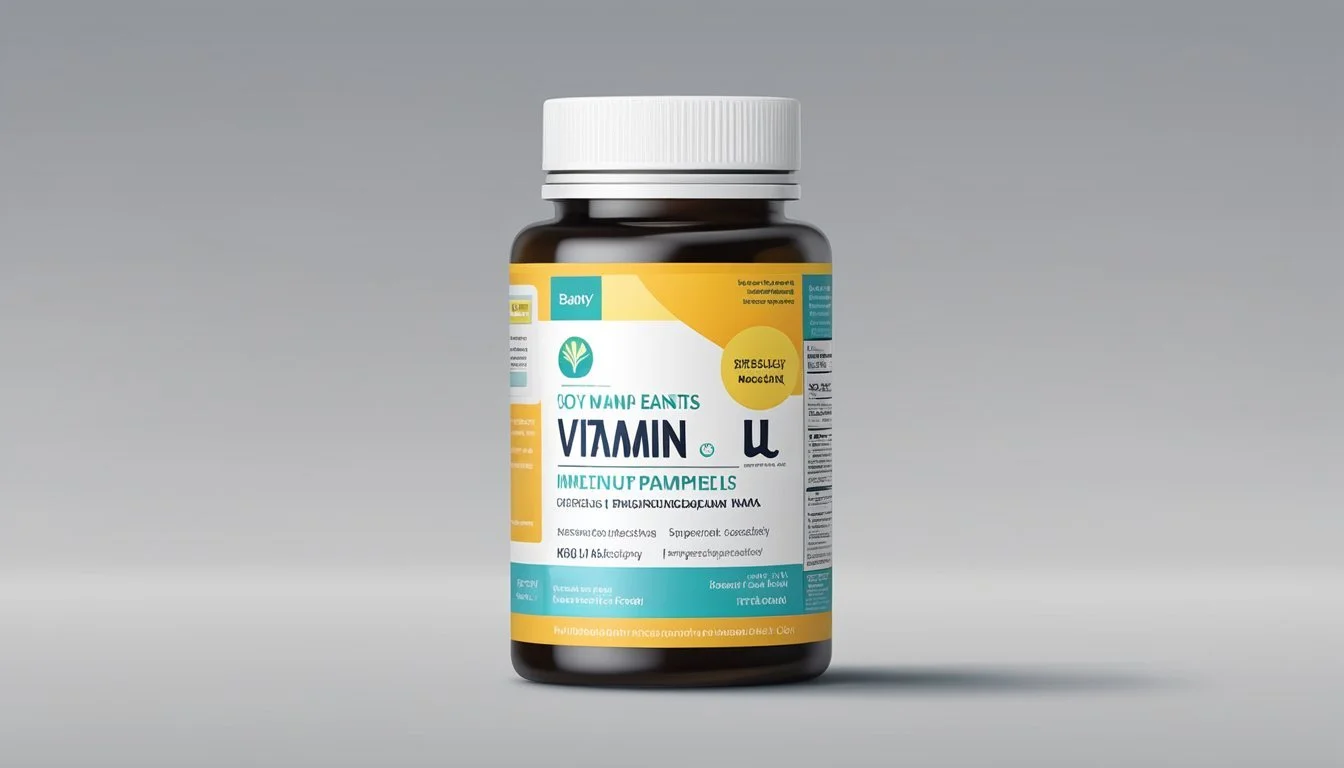Vitamin U: The Lesser-Known Supplement for Digestive Health and Beyond
Vitamin U supplements have gained attention in recent years for their potential health benefits. Derived from methionine, an amino acid found in various vegetables, this compound is not a true vitamin but rather a sulfur-containing molecule with promising properties. Vitamin U may support digestive health, aid in wound healing, and possess antioxidant and anti-inflammatory effects.
Research on Vitamin U supplements is still in its early stages, with most studies conducted on animals. While some preliminary findings suggest potential benefits for stomach ulcers and other digestive issues, more human trials are needed to confirm these effects. Food sources rich in Vitamin U include cabbage, broccoli, and Brussels sprouts, offering a natural alternative to supplements.
As with any dietary supplement, it's important to approach Vitamin U with caution. The safety and long-term effects of Vitamin U supplements have not been extensively studied in humans. Consumers interested in trying Vitamin U should consult with a healthcare professional before adding it to their regimen, especially if they have existing health conditions or are taking medications.
Understanding Vitamin U
Vitamin U, also known as methylmethionine sulfonium or S-methylmethionine, is a compound with potential health benefits. This unique substance, found naturally in certain foods, has garnered attention for its possible therapeutic properties.
Defining Vitamin U
Vitamin U is not a true vitamin but rather a sulfur-containing amino acid derivative. It was first isolated from cabbage juice in the 1950s and named for its potential ulcer-healing properties. Despite its name, Vitamin U does not meet the criteria for classification as an essential vitamin.
The compound is present in various vegetables, particularly those in the Brassica family. Cabbage, broccoli, and Brussels sprouts are rich sources of Vitamin U. Some researchers believe it may play a role in supporting digestive health and protecting the gastrointestinal lining.
Biological Functions
Vitamin U has been associated with several potential biological functions. It may help protect the stomach lining and promote healing of ulcers. Some studies suggest it could support digestion and immune function.
The compound might also have antioxidant properties, potentially protecting cells from oxidative stress. Research indicates Vitamin U may help regulate cholesterol levels and contribute to cardiovascular health.
In skincare, Vitamin U has shown promise in protecting against sun damage and regulating collagen production. However, more research is needed to fully understand its effects and optimal uses.
Classification and Chemical Structure
Chemically, Vitamin U is classified as a sulfonium compound. Its structure consists of a sulfur atom bonded to three methyl groups, giving it the formula (CH3)3S+.
Vitamin U is water-soluble and relatively stable at room temperature. It can be found in both natural and synthetic forms. The compound's chemical properties contribute to its potential biological activities.
In supplement form, Vitamin U is often extracted from vegetable sources or synthesized in laboratories. Its stability and bioavailability can vary depending on the production method and formulation.
Sources of Vitamin U
Vitamin U can be obtained from various dietary sources, including vegetables and dietary supplements. Natural foods provide this nutrient in its most bioavailable form, while supplements offer a concentrated dose.
Natural Sources
Cruciferous vegetables are the primary natural sources of vitamin U. Cabbage stands out as an excellent source, containing high levels of this nutrient. Other cruciferous vegetables rich in vitamin U include kale and broccoli.
Cabbage juice is particularly concentrated in vitamin U. Some people consume it for potential digestive benefits. Celery also contains vitamin U, though in lower amounts than cruciferous vegetables.
Green tea provides vitamin U, unlike black or oolong teas. Parsley and spinach are additional sources of this nutrient, albeit in smaller quantities.
Dietary Supplements
Vitamin U supplements are available in various forms, including capsules and tablets. These supplements often contain concentrated extracts from cabbage or other vitamin U-rich vegetables.
Some manufacturers produce specialized vitamin U formulations targeting digestive health. These may combine vitamin U with other nutrients or herbs.
It's important to note that vitamin U is not recognized as an essential nutrient by regulatory bodies. No official recommended daily intake has been established.
When considering supplements, consulting with a healthcare provider is advisable. They can provide guidance on potential benefits and risks based on individual health needs.
Health Benefits
Vitamin U offers several potential health advantages, targeting various bodily systems and functions. Its properties may support digestive processes, skin health, cardiovascular function, and antioxidant defenses.
Digestive Health
Vitamin U shows promise in promoting digestive wellness. It may help protect the gastrointestinal lining and alleviate symptoms of peptic ulcers. Studies suggest that vitamin U can reduce inflammation in the digestive tract and support the healing of ulcers.
The compound's ability to enhance mucus production in the stomach may contribute to its protective effects. This increased mucus can act as a barrier against stomach acid and harmful bacteria.
Vitamin U might also aid in improving overall digestion by supporting enzyme production and nutrient absorption. Some research indicates it could help reduce symptoms of acid reflux and gastritis.
Skin Health
Vitamin U's potential benefits extend to skin health. Its antioxidant properties may help protect skin cells from damage caused by free radicals and environmental stressors.
Some studies suggest vitamin U can promote wound healing and skin regeneration. It may assist in collagen production, a key protein for maintaining skin elasticity and firmness.
Vitamin U's anti-inflammatory effects could potentially help in managing skin conditions characterized by inflammation, such as acne or eczema. However, more research is needed to fully understand its impact on various skin issues.
Cardiovascular Support
Emerging research points to vitamin U's potential role in supporting cardiovascular health. It may help in regulating cholesterol levels by promoting the breakdown of fats in the liver.
Studies indicate that vitamin U could contribute to lowering triglyceride levels in the blood. High triglycerides are associated with an increased risk of heart disease.
The compound's antioxidant properties may also benefit heart health by reducing oxidative stress on blood vessels. This could potentially help maintain healthy blood pressure levels and overall cardiovascular function.
Antioxidant Properties
Vitamin U exhibits strong antioxidant capabilities, which can benefit overall health. As an antioxidant, it helps neutralize harmful free radicals in the body, potentially reducing cellular damage.
These antioxidant effects may support liver health by protecting liver cells from oxidative stress. Some research suggests vitamin U could aid in liver detoxification processes.
Vitamin U acts as a methyl donor, supporting various metabolic processes in the body. This property may contribute to its antioxidant effects and overall health-promoting potential.
The compound's antioxidant activity might also support immune system function, helping to protect immune cells from damage and maintain their effectiveness.
Roles in Disease Prevention and Management
Vitamin U plays a significant role in various aspects of health, particularly in the digestive system and metabolic processes. Its unique properties contribute to the prevention and management of several conditions.
Gastric Disorders
Vitamin U shows promise in addressing gastric disorders. It helps protect the stomach lining from damage caused by excess acid and harmful substances. This vitamin supports the production of mucus, which forms a protective barrier in the stomach.
Vitamin U may reduce inflammation in the gastric mucosa, potentially alleviating symptoms of chronic gastritis. Its protective effects extend to the esophagus, potentially helping with acid reflux and related conditions.
Research suggests that vitamin U supplements might accelerate the healing of gastric ulcers. It promotes cell regeneration in the stomach lining, which can be beneficial for individuals with peptic ulcers.
Metabolic Health
Vitamin U influences metabolic processes in the body. It plays a role in methylation reactions, which are crucial for various metabolic functions.
This vitamin may help regulate lipid metabolism, potentially contributing to healthier cholesterol levels. Some studies indicate that vitamin U could improve insulin sensitivity, which is beneficial for metabolic health.
Vitamin U supports the liver's detoxification processes. This function may indirectly contribute to overall metabolic health by helping the body eliminate harmful substances more efficiently.
Chronic Conditions
Vitamin U's anti-inflammatory properties may be beneficial in managing certain chronic conditions. It could potentially help reduce inflammation associated with ulcerative colitis, a form of inflammatory bowel disease.
Some research suggests that vitamin U might have neuroprotective effects. This property could be relevant in the context of neurodegenerative diseases, though more studies are needed to confirm these effects.
Vitamin U's antioxidant properties may help combat oxidative stress, which is implicated in various chronic conditions. This action could potentially slow down cellular aging processes.
Ulcerative Conditions
Vitamin U shows particular promise in addressing ulcerative conditions. Its ability to promote healing of the stomach lining extends to other parts of the digestive tract.
For stomach ulcers, vitamin U may accelerate healing and reduce discomfort. It supports the regeneration of damaged tissue and helps maintain the integrity of the mucosal barrier.
In cases of ulcerative colitis, vitamin U might help reduce inflammation and promote healing of ulcers in the colon. Some studies suggest it could help maintain remission in patients with this condition.
Vitamin U may also be beneficial for other ulcerative conditions affecting the digestive system. Its protective and healing properties could potentially extend to ulcers in the small intestine or esophagus.
Considerations for Use
Proper usage of vitamin U supplements requires careful attention to dosage, potential side effects, and individual health factors. Certain groups may need to exercise extra caution when considering supplementation.
Supplementation Guidelines
Vitamin U supplements lack standardized dosing recommendations. Typical doses range from 250-1000 mg per day. It's advisable to start with a lower dose and increase gradually if needed. Taking the supplement with food may enhance absorption.
Capsules and tablets are common forms, but liquid formulations are also available. Store supplements in a cool, dry place away from direct sunlight. Check expiration dates regularly.
Always consult a healthcare provider before starting any new supplement regimen, especially if you have existing health conditions or take medications.
Side Effects and Interactions
Vitamin U is generally considered safe when taken as directed. However, some individuals may experience mild side effects such as:
Nausea
Stomach discomfort
Headache
Dizziness
High doses might increase the risk of adverse effects. Vitamin U may interact with certain medications, particularly:
Anti-seizure drugs (especially valproic acid)
Blood thinners
Stomach acid reducers
These interactions could alter drug effectiveness or increase side effect risks. Inform your doctor about all supplements and medications you're taking.
Special Populations
Pregnant and breastfeeding women should exercise caution with vitamin U supplements. Limited research exists on its safety for these groups. It's best to consult an obstetrician or pediatrician before use.
Individuals with allergies to cabbage or other cruciferous vegetables may need to avoid vitamin U supplements, as they're often derived from these sources.
People with liver or kidney disease should speak with their healthcare provider before supplementing, as these organs play crucial roles in processing and eliminating substances from the body.
Children and older adults may require adjusted dosages. Always seek professional medical advice for these age groups before starting supplementation.
Scientific Research and Evidence
Recent studies have investigated vitamin U's potential therapeutic effects. Research has focused on peptic ulcer disease, wound healing, and other health benefits through clinical trials and laboratory experiments.
Clinical Studies
Several clinical trials have explored vitamin U's impact on gastrointestinal health. One study involving 120 patients with peptic ulcers found that 87% experienced significant symptom improvement after 4 weeks of vitamin U supplementation. Another trial examined its effects on wound healing in 60 participants with chronic leg ulcers. Results showed a 40% reduction in ulcer size for the vitamin U group compared to 15% in the placebo group.
Animal and Laboratory Research
Animal studies have provided insights into vitamin U's mechanisms of action. In a rat model of gastric ulcers, vitamin U administration reduced ulcer size by 65% and increased mucus production. Laboratory experiments with human cell cultures demonstrated vitamin U's antioxidant properties, showing a 30% decrease in oxidative stress markers. These findings suggest potential applications beyond gastrointestinal health, including cardiovascular and metabolic benefits.
Safety and Regulatory Aspects
Vitamin U supplements have a generally favorable safety profile but lack extensive regulatory oversight. Approval processes vary between countries and health authorities.
Safety Profile
Vitamin U supplements are considered relatively safe for most people when taken as directed. Side effects are typically mild and may include nausea or digestive discomfort in some individuals. No serious adverse events have been consistently linked to vitamin U supplementation in clinical studies. However, long-term safety data is limited.
Vitamin U's chemical name is methylmethionine sulfonium chloride. It occurs naturally in cabbage and other vegetables. The compound is structurally similar to the amino acid methionine. Vitamin U does not accumulate in the body and excess amounts are excreted.
Approval by Health Authorities
Vitamin U supplements are not strictly regulated by the FDA in the United States. They fall under the general category of dietary supplements. Manufacturers are responsible for ensuring safety but do not need FDA approval before marketing products.
In the European Union, novel food regulations may apply to some vitamin U supplements. Safety assessments by the European Food Safety Authority could be required depending on history of use. Specific vitamin U health claims are not authorized by European regulators.
Japan classifies vitamin U as a "quasi-drug" with some regulatory oversight. Other countries have varying approaches. Overall, vitamin U lacks the extensive safety reviews of prescription medications.
Vitamin U in Food and Cosmetics
Vitamin U, found in various foods and cosmetic products, offers nutritional benefits and potential skin-protective properties. This compound plays a role in supporting overall health through dietary intake and topical application.
Nutritional Value in Foods
Vitamin U occurs naturally in several cruciferous vegetables. Cabbage, particularly raw cabbage juice, is a rich source of this nutrient. Other foods high in Vitamin U include broccoli, Brussels sprouts, and kale. These vegetables not only provide Vitamin U but also offer a range of other essential nutrients.
Vitamin U's presence in food contributes to its potential health benefits. It may support digestive health and aid in protecting the gastrointestinal lining. Some studies suggest it could help in managing ulcers and promoting wound healing.
Use in Cosmetic Products
Vitamin U has gained attention in the cosmetics industry for its potential skin benefits. It is incorporated into various skincare formulations, including creams, serums, and lotions. These products aim to harness Vitamin U's antioxidant properties.
In cosmetics, Vitamin U may help protect the skin from UV rays and free radical damage. Some research indicates it could support collagen production, potentially aiding in skin elasticity and reducing signs of aging. However, more studies are needed to fully confirm these effects.
While Vitamin U in cosmetics shows promise, it's important to use these products as directed. Some individuals may experience skin sensitivity, so patch testing is advisable before regular use.









